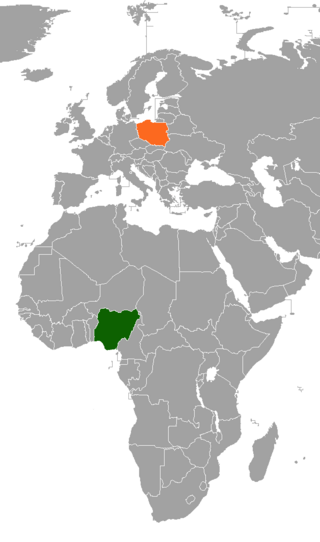Related Research Articles
Since independence, with Jaja Wachuku as the first Minister for Foreign Affairs and Commonwealth Relations, later called External Affairs, Nigerian foreign policy has been characterised by a focus on Africa as a regional power and by attachment to several fundamental principles: African unity and independence; capability to exercise hegemonic influence in the region: peaceful settlement of disputes; non-alignment and non-intentional interference in the internal affairs of other nations; and regional economic cooperation and development. In carrying out these principles, Nigeria participates in the African Union, the Economic Community of West African States (ECOWAS), the Non-Aligned Movement, the Commonwealth of Nations, and the United Nations.

Brazil–Nigeria relations are the current and historical relations between the Federative Republic of Brazil and the Federal Republic of Nigeria. Brazil and Nigeria maintain a traditional and diversified relationship, with a strong Nigerian influence on Brazilian cultural and social formation. Both nations are members of the Group of 77 and the United Nations.

Israel–Nigeria relations refers to the bilateral relations between the State of Israel and the Federal Republic of Nigeria. The Nigerian ambassador to Israel is David Oladipo Obasa. The Nigerian government is in collaboration with the Israeli government to bring science, technology and innovation (STI) to the youth of Nigeria in other to reduce the rate of unemployment amongst youth in the nation.

Indonesia and South Korea established diplomatic relations in 1973. Both countries share a common vision, values and the will to contribute to the international community as middle powers. Both countries are members of G-20 and APEC. South Korea has an embassy in Jakarta and Indonesia has an embassy in Seoul. According to a 2014 BBC World Service Poll, 48% of Indonesians view South Korea's influence positively, with 27% expressing a negative view. The Chinese Indonesian merchant Chen Yanxiang visited Korea between the 1390s and the 1410s, the first major contact between the two nations.

Indonesia and Nigeria established diplomatic relations on 5 March 1965. Both countries are members of multilateral organizations such as the Non-Aligned Movement, World Trade Organization (WTO), Organisation of Islamic Cooperation (OIC) and Developing 8 Countries. Indonesia has an embassy in Abuja and Nigeria has an embassy in Jakarta.

Mexico-Nigeria relations are the diplomatic relations between Mexico and Nigeria. Both nations are members of the Group of 15, Group of 24 and the United Nations.

Relations between the Republic of Singapore and the Republic of Korea started when a trade mission from South Korea visited the Colony of Singapore in 1950. The two countries established formal diplomatic relations in 1975, but South Korea established a trade office and a consulate-general, and sent a special envoy to visit Singapore before that. Both countries are the only two United Nations members in the Four Asian Tigers. In 2014, South Korea was the fourth-largest import source of Singapore.

Nigeria–Poland relations are the bilateral relations between Nigeria and Poland. Both nations are members of the United Nations and the World Trade Organization.

Equatorial Guinea–Mexico relations are the diplomatic relations between the Republic of Equatorial Guinea and the United Mexican States. Both nations are members of the Association of Academies of the Spanish Language, Organization of Ibero-American States and the United Nations.

Nigeria–Spain relations are the bilateral and diplomatic relations between these two countries. Nigeria has an embassy in Madrid. Spain has an embassy in Abuja and a consulate-general in Lagos.

Japan–Nigeria relations are the bilateral relations between Japan and Nigeria. The State of Japan has an embassy in Abuja and the Federal Republic of Nigeria has an embassy in Tokyo.

South Korea-Uzbekistan relations are the international relations between South Korea and Uzbekistan.
The Korean Cultural Center, Nigeria is a branch of the Korean Cultural Centers located in Abuja, Nigeria. It was established in May 2010. As with the other Korean Cultural Centers, it is operated by the Korean Culture and Information Service (KOCIS), which is operated by the South Korean government.
References
- 1 2 3 Kim, Pankyu. "Ambassador's Greetings". Embassy of the Republic of Korea to the Federal Republic of Nigeria. Retrieved 2024-04-03.
- 1 2 "Diplomatic Relations – Embassy of the Federal Republic of Nigeria to the Republic of Korea" . Retrieved 2024-04-03.
- ↑ Ozoemena, Emmanuel (2024-01-18). "Korean Cultural Centre in Nigeria deepens Korea-Nigeria relations through arts, culture". The Korea Post (in Korean). Retrieved 2024-04-03.
- ↑ Sankar, Vimal (2023-09-17). "Korean Cultural Centre in Nigeria conducts two-day taekwondo seminar". www.insidethegames.biz. Retrieved 2024-04-03.